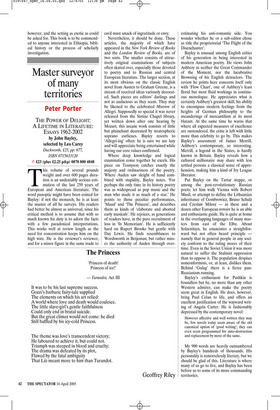Master surveyor of many territories
Peter Porter
THE POWER OF DELIGHT: A LIFETIME IN LITERATURE: ESSAYS 1962-2002 by John Bayley, selected by Leo Carey Duckworth, £25, pp. 677, ISBN 0715633120 ✆ £23 (plus £2.25 p&p) 0870 800 4848 This volume of several pounds weight and over 600 pages duration is an undeniably serious estimation of the last 250 years of European and American literature. The word panoptic might have been coined for Bayley: if not the monarch, he is at least the master of all he surveys. His readers had better be almost as universal, since his critical method is to assume that with so much known his duty is to adorn the facts with a few paradoxical interpretations. This works well at review length as the need for concentration keeps him on the high wire. He is the reviewer’s reviewer, and for a minor figure in the same trade to cavil must smack of ingratitude or envy.
Nevertheless, it should be done. These articles, the majority of which have appeared in the New York Review of Books and the London Review of Books, are of two sorts. The smaller consists of attractively original examinations of subjects often skated over, especially those devoted to poetry and to Russian and central European literature. The larger section, at its most obvious on the classic English novel from Austen to Graham Greene, is a stream of received ideas variously decorated. Such pieces are editors’ darlings and not as audacious as they seem. They may be likened to the celebrated Miserere of Allegri. Supposedly so special it was never released from the Sistine Chapel library, yet written down after one hearing by Mozart, this arcane work consists of little but plainchant decorated by stratospheric soprano curlicues. Bayley resorts to ‘Allegri-ing’ often: he is sure we are lazy and will appreciate being entertained while having our core values confirmed.
Where deep knowledge and logical examination come together he excels. His piece on Tennyson catches exactly the majesty and ordinariness of the poetry. Where Auden saw sleight of hand combined with stupidity, Bayley notes, ‘For perhaps the only time in its history poetry was as widespread as pop music and the man who made it as much of a star.’ He points to those peculiar performances, ‘Maud’ and ‘The Princess’, and describes them as kinds of ‘elaborate and aborted early musicals’. He rejoices, as generations of readers have, in the pure recruitment of loss in ‘In Memoriam’. He is sufficiently hard on Rupert Brooke but gentle with Day Lewis. He finds resemblances to Wordsworth in Betjeman, but rather misses the authority of Auden through over estimating his anti-romantic side. You wonder whether he or a sub-editor chose as title the proprietorial ‘The Flight of the Disenchanter’.
Bayley is unusual among English critics of his generation in being interested in modern American poetry. He views John Ashbery as neither the Great Commander of the Moment, nor the lucubrative Browning of his English detractors. The review he prints here concerns itself only with ‘Flow Chart’, one of Ashbery’s least florid but most fluid workings in continuous monologue. He appreciates what is certainly Ashbery’s greatest skill, his ability to encompass modern feelings from the heights of German philosophy to the meanderings of mercantilism at its most blatant. At the same time he warns that where all expected measures of excellence are surrendered, the critic is left with little more than celebrity to go by. This makes Bayley’s assessment of James Merrill, Ashbery’s contemporary, so interesting. Merrill, a legend in the States, is hardly known in Britain. Bayley reveals how a cultured millionaire may share with less settled persons a classical sense of apprehension, making him a kind of Ivy League liberator.
Put Bayley on the Tartar steppe, or among the post-revolutionary Russian poets; let him walk Vienna with Robert Musil, or attempt to define the Lithuanian inheritance of Gombrowicz, Bruno Schulz and Czeslaw Milosz — in these and a dozen other European terroirs he is an able and enthusiastic guide. He is quite at home in the overlapping languages of many masters from east of the Elbe. About Solzenitsyn, he enunciates a straightforward but not often heard principle namely that in general people in any society conform to the ruling mores of their time. Even in the Soviet Union it was more natural to suffer the Stalinist oppression than to oppose it. The population despises nonconformists, or, at least, dislikes them. Behind ‘Gulag’ there is a fierce panRussianism running.
Bayley’s enthusiasm for Pushkin is boundless but he, no more than any other Western admirer, can make the poetry seem great in English. He does, however, bring Paul Celan to life, and offers an excellent justification of the wayward writing of Angela Carter. He is fashionably depressed by the contemporary novel:
However affective and well written they may be, few novels today seem aware of the old canonical option of ‘good writing’; they can even seem programmed for auto-destruction and replacement by more of the same.
























































 Previous page
Previous page